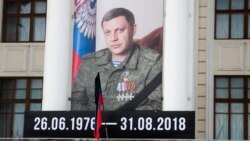Tillerson, Lavrov Discuss Ukraine, Syria Ahead Of UN General Assembly
By RFE/RL
U.S. Secretary of State Rex Tillerson and Russian Foreign Minister Sergei Lavrov have met in New York ahead of the opening of the United Nations General Assembly, with Ukraine and Syria key topics of discussion, officials said.
The U.S. State Department earlier had said that Tillerson would travel to the Russian UN mission to meet with his counterpart on September 17.
Department spokeswoman Heather Nauert after the session said in a statement that the diplomats "met this evening in New York on the sidelines of the United Nations General Assembly."
"The two recommitted to deconflicting military operations in Syria, reducing the violence, and creating the conditions for the Geneva process to move forward," she said.
Russian Foreign Ministry spokeswoman Maria Zakharova said the meeting covered the crisis in Syria, the conflict in eastern Ukraine, and "Middle East" issues.
Tillerson left the talks without speaking to reporters.
The meeting came at what Tillerson has called a "historic" low in post-Cold War relations between Russia and the United States, marred by tit-for-tat reductions to each country's diplomatic missions.
The United States has imposed sanctions on Moscow for what U.S. intelligence agencies say was widespread Russian interference in the 2016 U.S. presidential election.
Sanctions are also in place against Russia for its activities in Ukraine, including the annexation of the Crimean Peninsula and support for separatists in eastern Ukraine.
The conflict in eastern Ukraine between Kyiv's forces and Russia-backed separatists has killed more than 10,000 people since it erupted in April 2014.
Recent discussions have centered on the possibility of sending UN peacekeepers to eastern Ukraine, although the United States and Kyiv have said they do not want the deployment to cement a division of the country.
Washington and Moscow are at loggerheads as well in Syria, where Russia supports President Bashar al-Assad while the United States backs rebels fighting the government.
The U.S.-led coalition battling Islamic State (IS) militants in the war-torn country said the Russian military on September 16 struck forces backed by Washington, injuring several allied fighters. Russia denied the allegations.
UN-sponsored talks are being held in Geneva in search of a political solution to end the Syrian civil war. Separate talks are being conducted in the Kazakh capital, Astana -- sponsored by Russia, Iran, and Turkey -- to deal with cease-fire and other battlefield matters.
It was not immediately reported if the discussions involved the crisis over North Korea's continued defiance of UN resolutions against its testing of nuclear weapons and ballistic missiles. Russia and China have pushed back against U.S. demands for the two to take "direct action" against Pyongyang.
Lavrov is expected on September 21 to speak in front of the General Assembly, which runs through September 25.
Russian President Vladimir Putin will not attend the General Assembly. U.S. President Donald Trump is scheduled to speak before the 193-member UN on September 19.
With reporting by Reuters, AFP, and TASS
Here is today's map of the security situation in eastern Ukraine, according to the National Security and Defense Council:
'Rapid Trident' Military Drills Continue In Ukraine
U.S.-led military drills continue near the western Ukrainian city of Yavoriv. More than 1,800 troops from 14 countries are taking part in the Rapid Trident exercises, held each year since 1996. The two weeks of war games, which run until September 23, are designed to test and build Ukraine's interoperability with NATO allies and partners. It comes as Russia and Belarus hold joint military exercises, Zapad (West) 2017, involving about 13,000 troops. (U.S. Army video)
Russian Court Postpones Hearing On Siemens' Crimea Turbines Lawsuit
By RFE/RL
A Russian court has delayed hearings in a lawsuit filed by German conglomerate Siemens against a Russian state firm over the transfer of power turbines to Ukraine's Russian-occupied Crimea region.
A preliminary hearing had been scheduled for September 18, but the Moscow Arbitration Court rescheduled it for October 16, according to the court’s documents.
AFP news agency reported that the decision to postpone the hearings was made at the request of the defendant, Technopromexport, a subsidiary of state conglomerate Rostec.
Siemens lodged the suit against Technopromexport in July, after it emerged that four power turbines it sent to a power plant in Russia ended up in Crimea.
The transfer of the equipment to Crimea contravened European Union sanctions imposed after Moscow occupied and took control of the Black Sea peninsula in 2014.
Last month, the Moscow Arbitration Court rejected a request by Siemens to seize the gas turbines and to ban their installation ahead of preliminary hearings.
The turbines, manufactured in Russia by a joint project involving Siemens, were sold to Technopromexport in 2015.
Siemens says the equipment was to be installed at a plant in Taman, in southern Russia, and that the Russian company breached contract conditions by sending them to Crimea. It is seeking the return of equipment to its original point of destination.
Russian Deputy Energy Minister Andrei Cherezov told state-run news agency TASS earlier this month that the turbines were delivered to Crimea legally and will be put into operation according to an existing schedule, despite the lawsuit.
Moscow needs the turbines for two Crimean power plants in order to ensure a stable power supply for the peninsula’s residents.
Crimea used to rely on the Ukrainian power grid but is now dependent on Russian electricity.
Crimea has been subjected to EU sanctions on energy technology since Russian military forces seized control of the Ukrainian region in March 2014 and the Kremlin staged a referendum that has been deemed as illegitimate by most countries in the world.
Last month, the EU widened sanctions against Russian companies and persons, including Technopromeksport and Cherezov, over the transfer of the turbines to Crimea.
The Russian Foreign Ministry called the decision an "unfriendly and unjustified" step.







